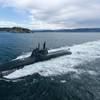Concerns Remain Over the Use of Low-sulphur Fuel
As a global move toward using cleaner fuel takes place, countries are forming new or reforming old regulations which see jurisdictions increasingly demanding the use of low-sulphur fuel in ships that berth in their ports. This results in a possibility for heavy penalties to be imposed on shipowners and Masters for the use of incorrect fuel.
Stuart Edmonston, Loss Prevention Director at UK P&I Club, comments on the increased demand for using low-sulphur fuels in shipping: “There are increasing demands on shipowners to comply with mandates regarding the use of low-sulphur fuels in ships. The move towards using cleaner fuels supports a global drive to reducing carbon emissions, with many countries forming new or reforming old regulations.”
Edmonston continued, “Shipowners need to be aware of the differing rules and costs across jurisdictions as they face significant fines for noncompliance. Hong Kong and Australia are the latest to introduce their own bespoke requirements. Low sulphur fuel (0.1 percent or less) will be mandatory for all cruise ships berthing in Sydney Harbour after October 1, 2015 and, in all New South Wales (NSW) ports after July 1, 2016. Owners can be fined up to $44,000 and the Master up to $22,000. In Hong Kong, all oceangoing vessels above 500 GT are required to switch to low-sulphur fuel (or LNG/or similar approved fuels) during the periods the ship is at a berth, excluding the first and last hour of the berthing period. The sulphur content of the fuel may not exceed 0.5 percent.”
“The requirements impose criminal sanctions against the owners, including any bareboat charterers and ship manager, and the Master. A contravention of the provisions relating to fuel use attracts a maximum fine of HK$200,000 and a maximum imprisonment of six months,” Edmonston said.
“Industry concerns include technical issues such as low viscosity, lack of lubricity, and low density of the new fuels. Other issues are the higher costs of these fuels, as well as difficulties in obtaining them in some parts of the world. To avoid such problems, shipowners should consult their engine and boiler manufacturers for advice on operating with low-sulphur fuels and the need for equipment and system modifications.”











